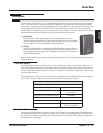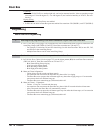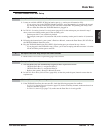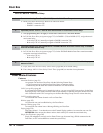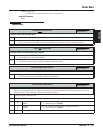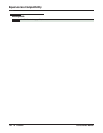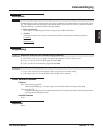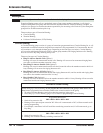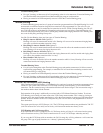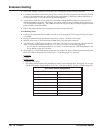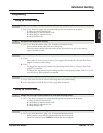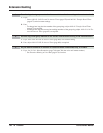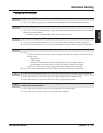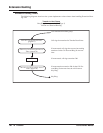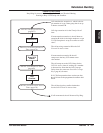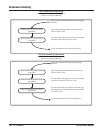
Extension Hunting
DSX Software Manual Features ◆ 155
Features
Circular Hunting Notes:
❥ For type 3 hunting, an Intercom call will stop hunting when it voice-announces. Extension Hunting fol-
lows the Handsfree Answerback/Forced Intercom Ringing setup at each extension.
❥ Placing an extension in DND temporarily removes it from the Circular Hunting group.
Terminal Hunting
A Terminal Hunting group consists of a group of extensions programmed into a Terminal Hunting list. A call
unanswered at a member extension rings the next extension in the programmed list. The call will cycle
through the group once, until it reaches the last extension in the list. Unlike Circular Hunting, the call will
not cycle back to the top of the hunt list. Depending on the hunt type (see below), Terminal Hunting will
occur for transferred outside calls, DILs to a hunt group member, and ringing Intercom calls. Hunting does
not occur for Key Ring and Ring Group calls.
Just like Circular Hunting, there are four types of Terminal Hunting:
❥ Ring No Answer Outside Calls (Option 1)
Hunting will occur for unanswered outside calls. Hunting will not occur for unanswered ringing Inter-
com calls or while the member extension is busy.
❥ Busy/Ring No Answer Outside Calls (Option 2)
Hunting will occur for unanswered outside calls and for outside calls to the member extension while it is
busy. Hunting will not occur for ringing Intercom calls.
❥ Busy/Ring No Answer All Calls (Option 3)
Hunting will occur for unanswered outside and ringing Intercom calls, and for outside and ringing Inter-
com calls to the member extension while it is busy.
❥ Busy Outside Calls (Option 4)
Hunting will occur for outside calls to the member extension while it is busy. Hunting will not occur for
unanswered outside and ringing Intercom calls.
Terminal Hunting Notes:
❥ If a call cycles through the entire Terminal Hunting group and remains unanswered, it follows normal
recall/routing programming. For example, a transferred call will recall the transferring extension and, if
still unanswered, go to Key Ring.
❥ Placing an extension in DND temporarily removes it from the Terminal Hunting group.
❥ For type 3 hunting, an Intercom call will stop hunting when it voice-announces. Extension Hunting fol-
lows the Handsfree Answerback/Forced Intercom Ringing setup at each extension.
Uniform Call Distribution (UCD) Hunting
Like Circular and Terminal Hunting, a UCD Hunting also consists of a group of extensions programmed into
a hunt list. The system routes calls into a UCD Group according to the frequency of use of the member
extensions. The first extension rung is the member that has been idle the longest. The last extension rung is
the member that has been idle the shortest.
Each member of the group is additionally associated with a UCD Master Extension Number. To activate
UCD Hunting, an incoming call must route to the UCD Group master number. This is done by placing an
Intercom call to the master number, transferring a call to the master number or setting up a DIL to the master
number. When all members of the UCD Group are busy, the call can route to the programmed UCD Over-
flow destination.
The system provides up to 8 UCD Groups (1-8). The UCD Group master numbers are predefined as 700-707
(with 700 reserved for voice mail), but can be any valid extension number not already in use.
UCD Hunting and Call Coverage Keys
If an extension has a Call Coverage key for a UCD Group, the key will ring if a call comes into the group
while all members are busy. This allows extension users to “cover” UCD Groups when they are busy.
If you set up the UCD Group with no members, the Call Coverage key will ring whenever a call comes into
the group. This type of group functions as a “dummy” (phantom) extension.



